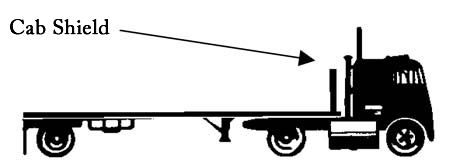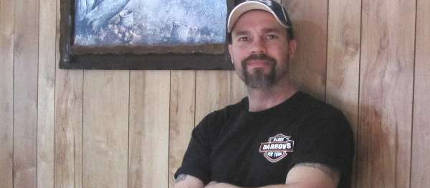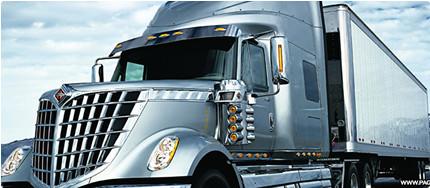Review Questions - Click On The Picture To Begin...

- Part of the structure, fitting, or attachment on a vehicle or cargo to which a tiedown is attached.
- A vertical barrier across a vehicle to prevent forward movement of cargo.
- A structure, device, or another substantial article placed against an article to prevent it from tipping that may also prevent it from shifting.
- A tapered or wedge-shaped piece used to secure round articles against rolling.
Quote From The CDL Manual:
Anchor point:
Part of the structure, fitting, or attachment on a vehicle or cargo to which a tiedown is attached.
- Pallet.
- Chock.
- Bulkhead.
- Edge protector:
Quote From The CDL Manual:
Edge protector:
A device placed on the exposed edge of an article to distribute tiedown forces over a larger area of cargo than the tiedown itself, to protect the tie-down and/or cargo from damage, and to allow the tiedown to slide freely when being tensioned.
- 20,000 lbs.
- 10,000 lbs.
- 41,500 lbs.
- 20,750 lbs.
Quote From The CDL Manual:
- The forward force (80% of the cargo weight) represents braking while driving straight ahead.
- The rearward force (50% of the cargo weight) represents vehicle acceleration or braking in reverse.
- The side-to-side or lateral force (50% of the cargo weight) represents traveling on a curve, ramp or changing lanes.
- The vertical force (20% of the cargo weight)) represents cargo vibration during transport. This requirement is satisfied when the cargo is "Fully Contained"
- Material used to fill a void between articles of cargo and the structure of the vehicle that has sufficient strength to prevent movement of the articles of cargo.
- An inflatable bag intended to fill otherwise empty space between articles of cargo, or between articles of cargo and the wall of the vehicle.
- A device placed between the deck of a vehicle and car or between articles of cargo, intended to provide greater friction than exists naturally between these surfaces.
- A waterproof sheet used to cover cargo.
Quote From The CDL Manual:
Dunnage bag:
An inflatable bag intended to fill otherwise empty space between articles of cargo, or between articles of cargo and the wall of the vehicle.
- A short piece of material, usually wood, nailed to the deck to reinforce blocking.
- A structure, device, or another substantial article placed against or around an article to prevent horizontal movement of the article.
- A vertical barrier placed directly behind the cab of a tractor to protect the cab in the event cargo should shift forward.
- A rail along the side of a vehicle that protects the side of the vehicle from impacts.
Quote From The CDL Manual:
Cab shield:
A vertical barrier placed directly behind the cab of a tractor to protect the cab in the event cargo should shift forward.
- The DOT and the FMCSA.
- The driver, the shipper, and the carrier.
- The driver and shipper.
- The shipper and carrier.
Quote From The CDL Manual:
Cargo Securement Responsibility:
According to federal and state regulations, the carrier and driver are responsible for ensuring that the vehicles, anchor points and other securement components are in good working order, with no obvious signs of damage. The driver is also required to conduct a pre-trip inspection by other operating regulations.




 Cargo Securement Terms That Truck Drivers Should Know:
Cargo Securement Terms That Truck Drivers Should Know:



 TT On Facebook
TT On Facebook